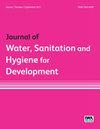Feasibility and acceptability of a novel intervention to improve hand hygiene behavior in rural Liberian health facilities
IF 1.4
4区 环境科学与生态学
Q3 WATER RESOURCES
Journal of Water Sanitation and Hygiene for Development
Pub Date : 2023-05-31
DOI:10.2166/washdev.2023.190
引用次数: 0
Abstract
Hand hygiene is central to the prevention of healthcare-associated infection. In low-income settings, barriers to health worker hand hygiene may include inconsistent availability of hand hygiene supplies at the point of care. However, there is a lack of knowledge of interventions to improve and sustain health worker hand hygiene in these settings. This pilot study evaluates acceptability and feasibility of a personally-worn hand hygiene holster device for improving point-of-care access to alcohol-based handrub (ABHR). Holsters were distributed to clinical staff at a hospital in Liberia in July–September 2021. Data collection included 2,066 structured observations of hand hygiene behavior, six spot checks of supply availability, and focus group discussions with 13 clinical staff. The Integrated Behavioral Model for Water, Sanitation, and Hygiene (IBM-WASH) provided a framework for study design and qualitative analysis. Acceptability of the intervention was high, with users reporting that holsters were comfortable, easy to use, and aligned with their professional identities. Feasibility depended on consistent ABHR availability, which may diminish sustainability of this intervention. The hand hygiene holster is a promising tool for improving health worker hand hygiene behavior, but solutions to ABHR supply chain and distribution constraints are necessary to support sustainability of this intervention.改善利比里亚农村卫生机构手部卫生行为的新干预措施的可行性和可接受性
手部卫生对于预防卫生保健相关感染至关重要。在低收入环境中,卫生工作者手卫生方面的障碍可能包括在医疗点获得的手卫生用品不一致。然而,缺乏在这些环境中改善和维持卫生工作者手卫生的干预措施的知识。本试点研究评估个人佩戴的手部卫生皮套装置的可接受性和可行性,以改善医疗点获得酒精基洗手液(ABHR)的机会。2021年7月至9月,向利比里亚一家医院的临床工作人员分发了皮套。数据收集包括对2066例手部卫生行为的结构化观察,6次供应情况抽查,以及与13名临床工作人员的焦点小组讨论。水、环境卫生和个人卫生综合行为模型(IBM-WASH)为研究设计和定性分析提供了一个框架。干预的可接受性很高,用户报告说,皮套舒适,易于使用,并符合他们的职业身份。可行性取决于持续的ABHR可用性,这可能会降低该干预措施的可持续性。手卫生皮套是改善卫生工作者手卫生行为的一种很有前途的工具,但要支持这一干预措施的可持续性,必须解决ABHR供应链和分配限制问题。
本文章由计算机程序翻译,如有差异,请以英文原文为准。
求助全文
约1分钟内获得全文
求助全文
来源期刊

Journal of Water Sanitation and Hygiene for Development
WATER RESOURCES-
CiteScore
3.10
自引率
11.80%
发文量
58
审稿时长
16 weeks
期刊介绍:
The Journal of Water, Sanitation and Hygiene for Development is a peer-reviewed journal devoted to the dissemination of high-quality information on the science, policy and practice of drinking-water supply, sanitation and hygiene at local, national and international levels.
 求助内容:
求助内容: 应助结果提醒方式:
应助结果提醒方式:


